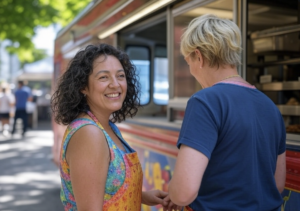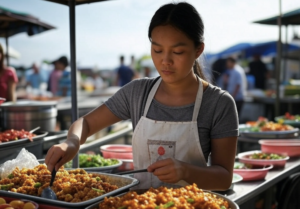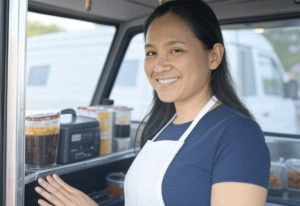The culinary world has often been painted as a male-dominated domain, a notion famously captured in James Brown’s song, “This Is a Man’s World.” From inventing cars to harnessing electricity, men have long been credited with shaping industries. Yet, as Brown himself acknowledged, these achievements would be hollow without the contributions of women. In the restaurant industry, this truth shines brightly. Despite outdated stereotypes that once confined women to home kitchens, female chefs and owners have been shattering glass ceilings, proving their prowess in professional kitchens across the globe. Legends like Julia Child set the stage, while countless women have transformed family recipes into thriving businesses, serving communities from humble trailers and street stalls. Whether it’s Latin matriarchs grilling tacos in the U.S., or women tending steaming pots at street markets in Europe, Asia, and Central America, their influence is profound. Without women, the culinary landscape, including the dynamic food truck movement, would lack the depth and diversity it enjoys today.
The Rise of Women in the Food Truck Industry
Food trucks have become a cherished part of modern street culture, delivering a wide array of flavors on the go. While the industry might appear male-driven at first glance, women have carved out a vital space, bringing innovation, resilience, and culinary excellence to the forefront. Female-founded food trucks are not just holding their own; they’re excelling, infusing the mobile dining scene with unique perspectives and tastes that make our streets more vibrant. Removing their influence would leave a gaping hole in both our communities and our palates. Let’s dive into the inspiring stories of women who have taken the food truck world by storm, proving that passion, grit, and creativity can turn dreams into delicious realities.

Outside a food truck.
Taco Heads: A Fort Worth Family Affair
In the heart of Fort Worth, Texas, sisters Sarah and Christina Castillo have built a local gem with Taco Heads. The journey began when the sisters, raised in a family where food was a love language, decided to channel their heritage into a business. Growing up, their kitchen was a hub of activity, filled with the aromas of sizzling meats and fresh tortillas. After years of working in corporate jobs, they yearned for something more personal. In 2015, they took a leap of faith, pooling their savings to buy a trailer and transform it into a mobile taqueria. Their vision was simple yet bold: serve authentic Mexican fare with a modern twist, all while creating a space where people could connect over food.
Today, Taco Heads operates out of a decent-sized trailer, often parked near an outdoor patio where customers can relax in the shade, a smart move given Fort Worth’s year-round tolerable weather. Their menu features crowd-pleasers like carne asada tacos, topped with house-made salsas, and breakfast tacos stuffed with fluffy eggs and chorizo. The sisters’ commitment to quality, from sourcing fresh ingredients to perfecting their recipes, has earned them a loyal following. Sarah often shares how their late grandmother’s recipes inspire their menu, a nod to the strong women who shaped their culinary journey. Taco Heads isn’t just a food truck; it’s a testament to sisterhood, heritage, and the power of women in the food truck scene.

Serving at a festival.
The Institute of Chili to Chamoy City Limits: A San Antonio Legacy Reimagined
San Antonio’s street food history is legendary, rooted in the “Chili Queens” who, in the late 19th century, set up outdoor stalls to serve spicy stews to locals and travelers alike. Ana Fernandez has proudly carried this legacy forward, weaving her family’s traditions into her food truck ventures. Ana’s story begins in her grandmother’s kitchen, where she learned to cook as a young girl, stirring pots of chili and shaping dough for waffles on an 88-year-old iron. Those early lessons sparked a lifelong passion for food, but it wasn’t until 2016 that Ana turned that passion into a business with The Institute of Chili.
Starting with limited funds, Ana poured her heart into the venture, even painting and decorating the truck herself. Her menu featured nostalgic dishes like her family’s chili recipe, brisket tacos, and those heirloom waffles, all served with a side of warmth and authenticity. The truck quickly became a San Antonio favorite, a modern homage to the Chili Queens who came before her. But Ana’s entrepreneurial spirit didn’t stop there. In 2020, she pivoted to a new concept, Chamoy City Limits, inspired by the shaved ice treats of her childhood. Using pickled fruits, candied peppers, and homemade chamoy, Ana created a refreshing menu that captures the flavors of her youth. Her story is one of resilience and reinvention, showing how women in the food truck industry can adapt while staying true to their roots.
Dolci Peccati: Sweet Dreams in Southern Florida
In the sun-soaked streets of southern Florida, twin sisters Nati and Stefanie have turned their love for gelato into a thriving business with Dolci Peccati. The sisters’ journey began in their early 30s, when both found themselves at a crossroads. Nati was working in graphic design, crafting visuals for brands, while Stefanie was stuck in a corporate job that left her unfulfilled. Over late-night conversations, they dreamed of starting something together, something that would bring joy to others. Their shared love for gelato, discovered during a trip to Italy, became the spark they needed.
In 2017, they left their careers behind, bought a truck, and launched Dolci Peccati, which translates to “sweet sins” in Italian. Nati’s design skills came in handy, creating a truck that’s as visually stunning as the gelato they serve, with a sleek, modern look that stands out in Florida’s bustling food truck scene. Their menu features creamy gelato in flavors like pistachio, mango, and dark chocolate, all made with high-quality ingredients. The sisters often experiment with seasonal flavors, like key lime pie gelato, to keep things fresh. Their hard work has paid off, with Dolci Peccati becoming a go-to spot for locals and tourists alike. Nati and Stefanie’s story is a reminder that women can turn their passions into successful ventures, even in a competitive market like southern Florida.
More Inspiring Woman-Founded Food Trucks
The impact of women in the food truck industry extends far beyond these stories. Across the U.S., female entrepreneurs are making waves with their creativity, determination, and heart. Here are a few more examples of female-founded food trucks that have turned challenges into opportunities, showcasing the diversity and strength of women in this space:
- Candy Zoo (New York City): Co-founded in 2022 by three mothers, Candy Zoo is a whimsical food truck that brings sweetness to NYC streets. The trio, lifelong friends who bonded over their love for candy, dreamed of opening a store but opted for a mobile venture to start. Their truck offers classics like Sour Patch Kids and nostalgic treats like Pop Rocks and Ring Pops, delighting kids and adults alike. The mothers’ shared vision and teamwork have made Candy Zoo a hit at festivals and events, proving that women can create joyful, family-friendly businesses on wheels.
- Graziella’s (New York): Gracie DiFeo’s story with Graziella’s is the epitome of the American dream. An Italian immigrant who arrived in the U.S. in the 1970s, Gracie started as a dishwasher, working long hours to support her family. Her passion for cooking led her to become a chef, and in 2018, she launched Graziella’s, a food truck serving authentic Italian dishes like creamy risottos and hearty pasta. Gracie’s journey from humble beginnings to food truck owner highlights the resilience of female immigrants, showing how determination can turn dreams into reality.
- Leila’s Crepes and Empanadas (New York): Leila’s story began in 2015 when she and her fiancé Nick bought a vintage trailer, transforming it into a crepe truck. Leila, who grew up in a family of bakers, poured her heart into perfecting her crepe recipes, offering both sweet options like Nutella and banana and savory ones like ham and cheese. The truck’s success led her to expand in 2020 with Leila’s Empanadas, serving steak, chicken, cheese, and vegan empanadas, as well as arepas. Leila’s ability to scale her business while maintaining quality showcases the adaptability of women in the food truck industry.

Do you think about owning a food truck
- Baked in Color (New York): Julie Waxman founded Baked in Color after spotting the trend of rainbow-colored desserts. A self-taught baker, Julie perfected her chocolate chip cookie recipe in college, and in 2019, she turned it into a vibrant business. Her truck serves cookies in bright hues, from neon pink to electric blue, all made with natural dyes and packed with flavor. Julie’s knack for innovation and trend-spotting has made Baked in Color a New York favorite, proving that women can lead in the dessert scene with creativity and flair.
- The Oyster Lover (New York): Brittany Buffaloe launched The Oyster Lover in 2021 to support her husband’s oyster farm while bringing fresh, locally farmed oysters to New Yorkers. Growing up near the coast, Brittany developed a love for seafood, and her truck reflects that passion, offering raw oysters with house-made mignonette and grilled options with garlic butter. Her commitment to sustainability, sourcing only from local farms, has earned her a loyal following. Brittany’s story highlights how women can carve out niches in the food truck industry, blending purpose with profit.
- Makina Cafe (New York City): Eden Egziabher’s Makina Cafe stands out in New York City for its fusion of Ethiopian, Eritrean, and Italian flavors. Born in Ethiopia to parents of Eritrean descent, Eden launched her truck in 2018, drawing on family recipes to create dishes like injera wraps filled with spicy lentils and berbere-spiced chicken. Her journey wasn’t easy; as a Black woman in a competitive industry, she faced skepticism, but her perseverance paid off. Makina Cafe has become a beloved spot, showing how women can bring cultural diversity to the food truck scene while overcoming adversity.
- Kabba’s Kitchen (Portland): Kabba Saidikhan, a Senegalese immigrant, opened Kabba’s Kitchen in 2020, bringing West African flavors to Portland. Her truck, parked in a Northeast Portland lot, serves dishes like roasted chicken dibi, lamb brochettes, and fataya (deep-fried meat pies), alongside homemade hibiscus drinks. Kabba’s journey began after years of working in restaurants, saving every penny to start her own business. Her food truck is a love letter to her heritage, and her warm smile as she serves customers reflects the joy she finds in sharing her culture. Kabba’s story underscores the strength of immigrant women in the food truck world.
These women are more than just food truck owners; they’re pioneers who challenge stereotypes and enrich the culinary world with their diverse backgrounds and innovative ideas. Supporting female-founded food trucks isn’t just about enjoying great food. It’s about fostering a more inclusive industry where women’s contributions are recognized and celebrated. From tacos in Texas to gelato in Florida, candy in New York, and West African fare in Portland, these entrepreneurs show that the food truck scene is as much a woman’s world as it is a man’s. Next time you’re craving a street-side meal, seek out a female-owned food truck and taste the difference that passion, resilience, and creativity can make.

Leave A Comment